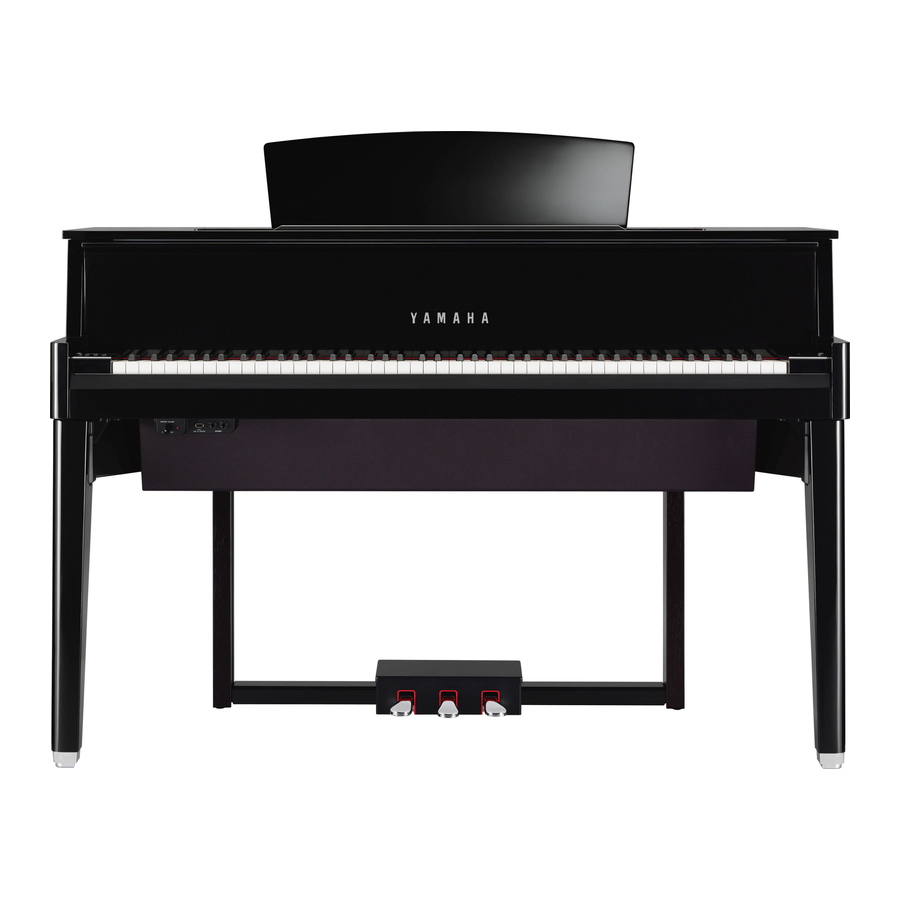Yamaha AVANT GRAND N1 Manuel du propriétaire - Page 28
Parcourez en ligne ou téléchargez le pdf Manuel du propriétaire pour {nom_de_la_catégorie} Yamaha AVANT GRAND N1. Yamaha AVANT GRAND N1 50 pages.

Listening to songs in USB Flash Memory
Selecting songs with the keyboard
Forward 1 song:
Press the C#5 key while holding down the [DEMO/SONG] button.
Rewind 1 song:
Press the B4 key while holding down the [DEMO/SONG] button.
Forward 10 songs:
Press the D5 key while holding down the [DEMO/SONG] button.
Rewind 10 songs:
Press the A#4 key while holding down the [DEMO/SONG] button.
Select the " U xx" (xx is a number 00–99) song:
Press the C5 key while holding down the [DEMO/SONG] button.
Play back all:
Press the G5 key while holding down the [DEMO/SONG] button.
Play back randomly:
Press the G#5 key while holding down the [DEMO/SONG] button.
Data format
This instrument can play back files of SMF Format 0 and Format 1 (Standard
MIDI file).
When playing songs copied to a USB flash memory device from a computer or
other device, the songs must be stored either in the USB flash memory's root
directory or a first-level/second level folder in the root directory. Songs stored in
these locations can be played as song data. Songs stored in third-level folders
created inside a second-level folder cannot be played by this instrument.
USB flash memory
(Root)
When copying song data from computer to USB flash memory, make sure to
save it by using SMF Format 0 and Format 1. Keep in mind that songs recorded
on other devices may use a variety of voices not available on this instrument and
hence may sound different than the original songs.
28 • N1
Owner's Manual
A#4
B4
Song
File
Song
Folder
Song
File
Song
Folder
Song
File
Song
Folder
C#5
G#5
C5 D5 G5
Can be played.
Cannot be played.
U
"
xx":
The smallest number among
U00
–
U99
is selected. If there are no any "
U
xx" songs,
the smallest number among
F00
–
F99
is selected.
If a USB flash memory device is not con-
nected or there are no USB songs, the
Usr
"
" song is selected.
What is SMF (Standard MIDI File)?
The SMF (Standard MIDI File) format is one
of the most common and widely compatible
sequence formats used for storing
sequence data. There are two variations:
Format 0 and Format 1. A large number of
MIDI devices are compatible with SMF For-
mat 0, and most commercially available
MIDI sequence data is provided in SMF
Format 0.
The user song is saved as SMF Format 0.
